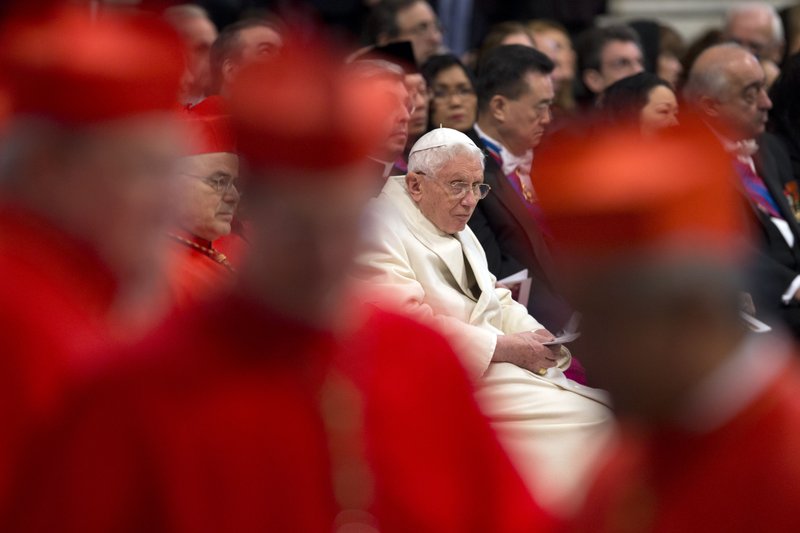VATICAN CITY -- Retired Pope Benedict XVI has acknowledged that governing the church wasn't his strong suit but says he doesn't see his papacy as a failure and that he succeeded at least in breaking up the Vatican's "gay lobby."
In a first-ever book by a retired pope reflecting on his papacy, Benedict also says he was shocked, and initially uncertain, about the election of Pope Francis as his successor. But he said he immediately realized the significance of electing a Latin American pope and has been very happy with Francis' papacy.
Excerpts of the book, titled Last Conversations, were published Thursday in the Italian daily Corriere della Sera and the German weekly Die Zeit and the daily Bild. The book was prepared as a long interview with German journalist Peter Seewald, who has conducted several interviews with Benedict from the time he was Cardinal Joseph Ratzinger.
It is being published just weeks after a major biography of Benedict that included a foreward written by Francis was released, suggesting something of a lifetime bookend for the German theologian, who will turn 90 in April.
In the excerpts, Benedict acknowledges the "difficult moments" of his papacy -- the sex-abuse scandal which reignited in 2010, the scandal over his exoneration of a Holocaust-denying bishop, and finally the leaks of his personal papers by his own butler.
"A weak point of mine was maybe little resolve in governing and making decisions," admitted the ex-pontiff in the book, according to a translation in the National Catholic Reporter. "In reality I am more a professor, one who reflects and mediates on spiritual questions. Practical governance is not my strong point and this is certainly a weakness.
"But I don't see myself as a failure. For eight years I did my service" and many people found a new path to their faith, he said.
Benedict said he was at first unsure about his successor, Pope Francis, but soon came to admire him. He called him a "man of practical reform," and said that he "has the ability to put his hands to action in an organized way. I knew that this was not my strong point."
One governance success was the dissolution of the "gay lobby" in the Vatican, Benedict said.
The existence of this group of gay prelates -- who purportedly used blackmail to promote and preserve their interests -- has been mythologized in Italian media, particularly after Benedict named a commission of three cardinals to investigate the leaks of his papers in 2012.
Seewald asked if such a clique existed.
"Indeed a group was pointed out to me, in the meantime we have dissolved it," Benedict said. "This was mentioned in the report by the commission [of three cardinals], who were able to nail down a small group of four or five people maybe, which we dissolved. I don't know whether something new will form again. In any case, it's not like there are things like this all over the place."
Benedict said he was not blackmailed or pressured to leave, as some have speculated.
Benedict in 2013 became the first pope in 600 years to retire. He has been living a quiet life of prayer and keeping up his correspondence in a converted monastery in the Vatican gardens.
He said he was preparing for his own death by getting ready to encounter God.
"The important thing isn't imagining it, but living with the knowledge that all our lives are headed toward this encounter," he said.
Michael J. O'Loughlin, a national reporter for the Jesuit-run America Magazine, said he could understand Benedict's interest in taking a last opportunity to define his legacy and shape the issues he cares about.
Information for this article was contributed by Kirsten Grieshaber and Nicole Winfield of The Associated Press and by Michael Alison Chandler of The Washington Post.
A Section on 09/09/2016

